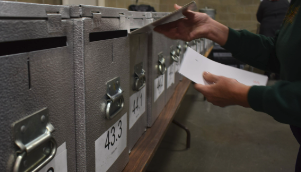
- Details
- By Native News Online Staff
Native Vote 2024. The Montana Supreme Court on Wednesday struck down four state laws that were passed by the Republican-controlled legislature to restrict voters. Two of the laws would have suppressed Native American votes.
The state’s highest court ruled the laws unconstitutional. Four of seven of the Supreme Court justices signed the opinion. The laws “violate the fundamental right to vote provided to all citizens by the Montana Constitution,” according to the ruling's summary.
One measure, HB 176, would have ended Election Day registration; the other, HB 530, aimed to prohibit paid third-party ballot assistance. Native American voters living on reservations disproportionately rely upon both Election Day registration and ballot assistance to cast votes in Montana.
On Wednesday, the ruling said both HB 176 and HB 530 disproportionately and unconstitutionally burdened the voting rights of Native Americans, in part because it is “much more difficult on average for people living on reservations to either get to a polling place on or before election day, or to mail an absentee ballot prior to election day.”
The decision affirms a September 2022 decision from the Thirteenth Judicial District Court, which permanently enjoined both HB 176 and HB 530 as unconstitutional.
Plaintiffs Western Native Voice, Montana Native Vote, the Blackfeet Nation, the Confederated Salish and Kootenai Tribes of the Flathead Reservation, the Fort Belknap Indian Community, and the Northern Cheyenne Tribe filed suit, Western Native Voice v. Jacobsen, against HB 176 and HB 530 in May 2021.
“Victory in a lawsuit is not just about winning in the courtroom, but it’s about upholding justice and defending the truth and restoring balance,” Ronnie Jo Horse, executive director of Western Native Voice, said. The Supreme Court ruling, she added, is “not just a win for us but for all of Montana.”
The plaintiffs were represented by the Native American Rights Fund, American Civil Liberties Union, ACLU of Montana, and Harvard Law School’s Election Law Clinic.
“Today’s decision is a resounding win for tribes in Montana who have only ever asked for a fair opportunity to exercise their fundamental right to vote,” NARF Staff Attorney Jacqueline De León said. “Despite repeated attacks on their voting rights, Tribes and Native voters in Montana stood strong, and today the Montana Supreme Court affirmed that the state’s legislative actions were unconstitutional. Native voices deserve to be heard and this decision helps ensure that happens.”
More Stories Like This
Native News Weekly (August 25, 2024): D.C. BriefsCheyenne River Youth Project to Celebrate Women’s Strength at Barbie-Themed Passion for Fashion on March 14
Celebrating Native American Women
Native Bidaské: The Illusion of Freedom and the Myth of America 250, Leonard Peltier Speaks Out
Monday Morning (March 2, 2026): Articles You May Have Missed This Past Weekend
Help us defend tribal sovereignty.
At Native News Online, our mission is rooted in telling the stories that strengthen sovereignty and uplift Indigenous voices — not just at year’s end, but every single day.
Because of your generosity last year, we were able to keep our reporters on the ground in tribal communities, at national gatherings and in the halls of Congress — covering the issues that matter most to Indian Country: sovereignty, culture, education, health and economic opportunity.
That support sustained us through a tough year in 2025. Now, as we look to the year ahead, we need your help right now to ensure warrior journalism remains strong — reporting that defends tribal sovereignty, amplifies Native truth, and holds power accountable.
 The stakes couldn't be higher. Your support keeps Native voices heard, Native stories told and Native sovereignty defended.
The stakes couldn't be higher. Your support keeps Native voices heard, Native stories told and Native sovereignty defended.
Stand with Warrior Journalism today.
Levi Rickert (Potawatomi), Editor & Publisher


